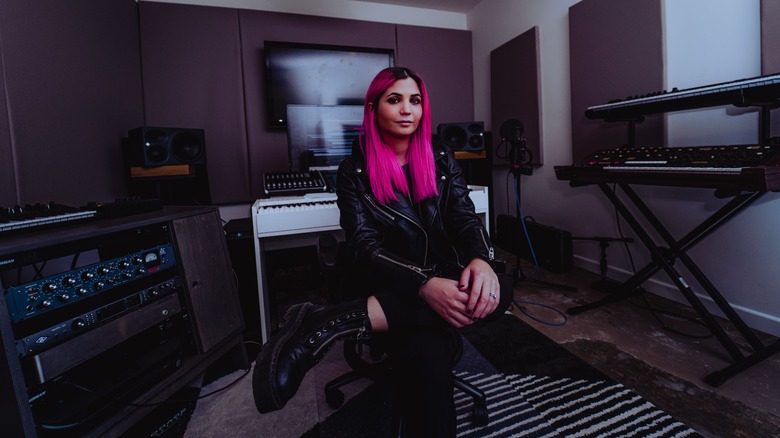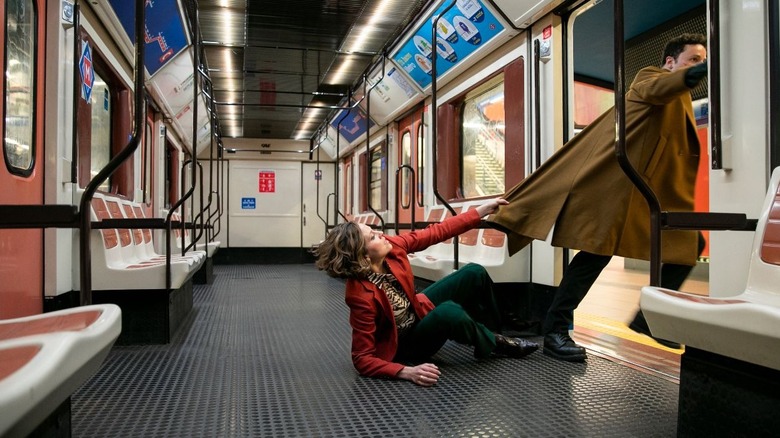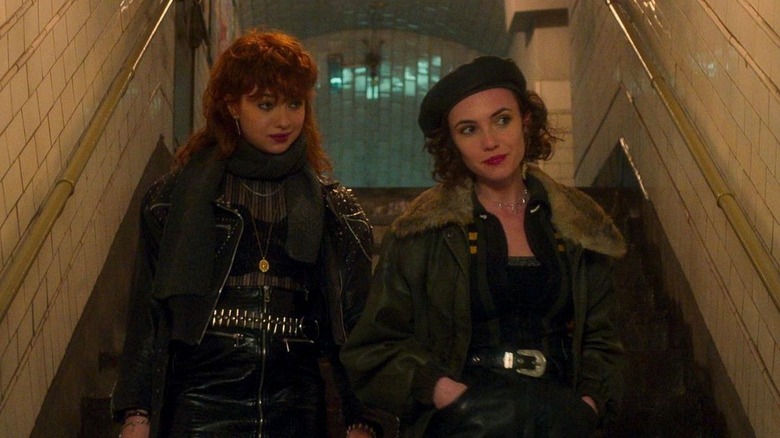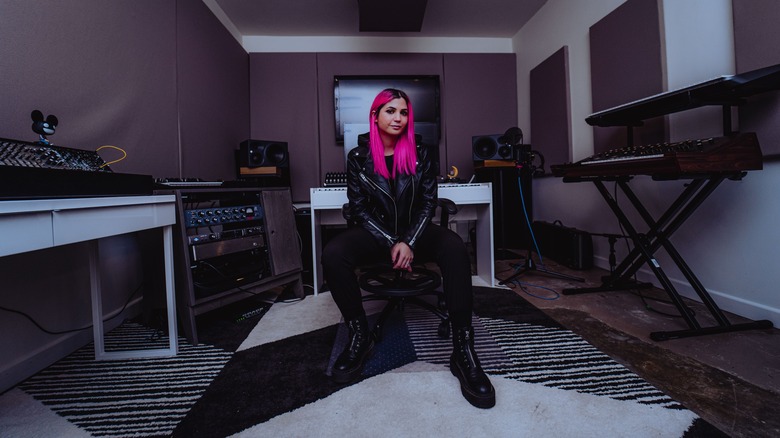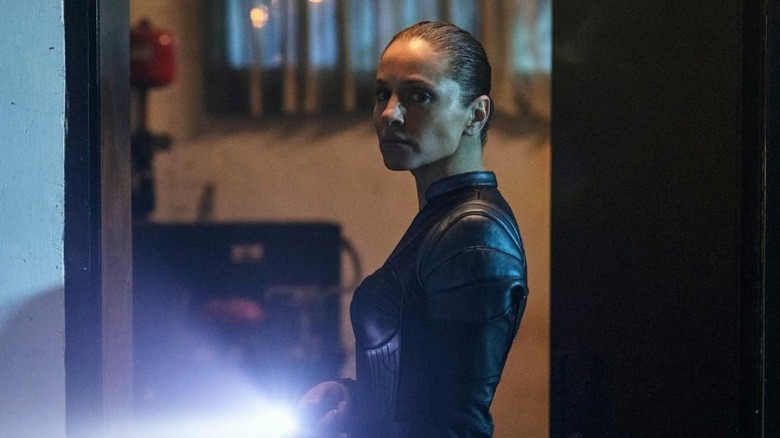In From The Cold Composer Tori Letzler On Creating The Show's Equivalent Of A Bond Theme [Interview]
"I'm the voice that everyone's heard, but nobody knows who I am."
That may change soon for composer Tori Letzler, whose voice has indeed been heard all over the world. The vocalist was featured on "Captain Marvel," "The Crown," and "Wonder Woman," to name a few of many credits. Since her teen years Letzler has been a working musician, though, starting with her touring days in Cirque du Soleil. Beyond bringing her vocal talent to an array of projects, in addition to her solo work under the name TINYKVT, she's scored for film, television, and even trailers.
She's now delivered one of her most ambitious scores to date with Netflix's "In From the Cold." Showrunner Adam Glass' supernatural sci-fi spy thriller is, as Letzler says, wall-to-wall music. While paying homage to '90s industrial music, the composer relished the creative freedom the first season of the show provided her. Recently, she told us about her experience scoring "In From the Cold" and her career, including scoring trailers, her fondness for synth scores, and working at Hans Zimmer's studio.
"You're chasing the next episode."
The show has science-fiction, it is a spy thriller, and a family drama, so how was it scoring to all these different genres but making them all of a piece?
For me, genre bending is not a new thing. I've worked in a ton of different spaces and I've scored a lot of trailers, which jump all over the map. The thing with this show is, yes, there are a lot of different story points and a lot of different emotions, but the sound of the show mostly stays, in my opinion, pretty cohesive.
Because this show was delayed for so long — I was hired in March of 2020, and we didn't start really scoring until February of 2021 — I had a lot of time with the scripts and to think about the story. Our creator, Adam Glass, is such a music fan himself. He thinks of it as just as important as other aspects of the show, which not everyone does. We're often brought in at last as opposed to at the very beginning, so we created a sound and figured out what we wanted the show to be sonically early on. It allowed me to use that sound to carry through all the emotions of the show.
Often you hear composers have two or four weeks.
I have had to do things in a week or two weeks. Trailers? 24 hours. That's pretty normal. So there was a luxury of — it's not as if we had a lot of time before it was turned in, but we had a lot of time to think about themes in advance.
The episodes have a ton of music in them. They're like 45 to 50-minute long episodes. Basically, they have wall to wall music. I wrote something like six or seven hours of music for this show, which is kind of crazy. While I was turning in a lot of music, the groundwork that was laid beforehand is a luxury that I usually don't have. I was sending pieces of music to them while they were on set and they were listening to stuff.
The problem with TV often, especially if it's network TV, is you're chasing the next episode. You get things weekly or biweekly versus with streaming, I wasn't necessarily chasing after everything because everything airs technically at once. It had a luxury of exploring themes the way you would in a film, as opposed to sometimes what you don't get in television.
What about the scripts influenced your score then?
Right off the bat, when I read the script, I think the heart of the show is that it is a female-centered show, but not in a way where it's trying to push an agenda. It's not trying to be female-fronted to appease anyone. It's just showing strong female characters, and that's something I relate to because I want to tell stories, and they don't necessarily need to be my stories or stories related to me, just about strong characters. I think Adam, he'll tell you himself, wrote this almost as a love letter to the women in his life and his family. He respects strong female characters. I just wanted to make sure that our lead character had themes that were as strong as the character.
Now, our lead Jenny [played by Margarita Levieva], if you watch the show, we get two timelines: We go through the past and the present. We have Jenny in present day and then her former spy self, Anya, in '90s Russia. We wanted to make sure that we were paying homage to '90s industrial music, but also staying present and having a sound that would carry us back and forth. That was always the number one thing. Adam and I share a love for '90s music, so it was an easy sell on that point.
How did you want to pay homage to '90s industrial music?
The score is chock-full of analog. It has a ton of analog synths. I used my Eurorack a lot. Speaking of groundwork for this show, I did these large sampling sessions where I just recorded my Eurorack for two, three hours at a time, and then had myself, my assistant, and my husband, who was my additional composer on this project, we sat through and chopped up those samples early. Basically, we came up with our own essential library of sounds to be used in the show.
I knew that it was going to be important early on to nail down that slightly authentic '90s sound, which was early days of Nine Inch Nails and How to Destroy Angels and people experimenting. To me, the score is very experimental. It has very little organic instruments in it, which was decided early on. Even our action scenes have very little, if any, organic percussion. It's just in your face and aggressive. But then we have the vocal as the main organic element, which is sung by myself. I keep saying it was a masterclass for me learning how to produce my vocals in weird ways, so that we have this organic element, but it doesn't stray too far away from the electronic nature of the score.
How did you want your vocals to supplement that electronic nature of the score?
One of the reasons I was brought onto the project were the vocals. There's a vocal theme written into the script. Adam knew that he wanted to have vocals heavily involved. I think if somebody were to tackle this score who wasn't a vocalist and had to bring somebody in, it would've been challenging because there was so much back and forth and a lot of stuff that needed to be played on set. It's possible, but I think it was just easier to have someone like myself who does all the vocals.
That being said, there was a lot of experimenting early on. The lullaby theme, which you hear bits of in the transitions from present day to past, it's also right at the opening of the show and it's a vehicle for one of our characters as well. We just knew, right off the bat, that was the first piece of music and theme we had to tackle. I was so inspired by the script and the idea of old Russian technology that I wanted to make the main theme sound like it was sung through an old Russian spy radio. I did that by experimenting with different distortions and different filters, and I think it came out pretty cool.
And then the beginning of that vocal, which is used in the transitions in our show, I'm using this granular plugin called Portal from a company called Output. Basically, it allows my voice to shift and echo in weird hypnotic ways and just a bunch of layering and playing around. When I sent it originally to Adam, that theme basically didn't change from its original version. You hear it in a lot of different variations in the show, but like the theme, that was the first thing we did. It was the cornerstone for the sound of the show.
"The world of synths is ever-expanding."
You were also inspired at one point by a Russian folk song, right?
There's an old Russian folk song that Adam had brought to the table really early on and it was a big inspiration for episode 1. So I took kind of the lead from the scale that was used in that lullaby to create our lullaby. They're not the same thing by any means, but it was just a really good benchmark for what we were looking at in terms of scale and tone.
I would say most of the score is not "Russian" or "Eastern European" at all. We kind of talked about early on we didn't want to hit it on the nose. We wanted to be cool and modern while [throwing] back to that time, but we didn't want it to be Russian necessarily. But that is the one part of the show where there is some Eastern European scale influence.
Your work with that music supervisor is seamless. It's hard to tell at times if it's the score or source music.
That was the goal, so I'm really glad you felt that. I think it's so important that music gets brought on earlier, and I wish that other projects would do it. Obviously, that's not always something that's possible, but because the music supervisor, Michelle Johnson, and I were brought on so early and were given freedom to work together and with editorial, you don't know where source and score begin and end. I think that's so important because sometimes when you're bouncing back and forth, it can pull you out of a world and affect your experience as a watcher. It was a cool experience for me.
Do you have much freedom when scoring trailers?
No, there's no freedom. I mean, that's not true. Trailers, I love them and I hate them. They have very quick deadlines. A lot of that work is done on spec, but I work with a lot of great people. I work with a company called The Hit House, mainly doing stuff for Disney and Warner Brothers. It was a real bootcamp when I first went freelance about five or six years ago, because you have to write in every genre possible in the shortest amount of time possible with usually no live players. I think if anyone's trying to break into this career, I think trailers and library music is an amazing place to start. It's also a great way to make passive income.
When you attended Berklee and studied composing, do they talk much about scoring trailers or that side of the job?
Not when I was there. I was there over a decade ago. The industry has just changed since I was in school. I think that they probably talk about that stuff now. I know that they teach about music supervision now, which wasn't done when I was there. I think it's crucial for colleges to teach people about all the other jobs in film and TV music, not just film scoring. I think it's crucial that students and young people know in general what a music editor does, what their function is, what a music supervisor does, copyist, all these things.
When you're in school and you're like, "I want to be a composer," which is what I did and what I am now, it's important to know that there's not just one lane for yourself. If you decide you want to be in this industry, but you don't necessarily want to be a composer anymore, there's a million other avenues that you can do. When I was there it wasn't super talked about. But that being said, I know that curriculums have evolved since then.
Was it fulfilling studying music at Berklee, though?
Oh, absolutely. I didn't graduate, and I left early, but it was great. I mean, I was there for like two and a half, three years, and I had one of my biggest inspirations as a composer, my professor, Richard Davis. He was incredible, and I think is a real inspiration to how I write thematically today.
Berklee gave me the connections that allowed me to start working at Hans Zimmer Studio, and I was there for three plus years. And that's how I made a lot of my connections in the industry. It's how I started singing in the industry. It's where I met Lorne Balfe, who put me on my first film score. Berklee and other music schools, it's not just the knowledge that you get at the school, but it's the connections you make while you're there. Your network of people is so crucial as a composer. So many people that were in my classes are people that I work with today. I think that's something that can't be discounted.
Working at Hans Zimmer's studio, did you get a chance to experiment with synths?
No. I always remind people this, because I think it gets misconstrued, I never wrote for Hans. I have sung on a plethora of his scores and for others that have worked around him. But being under that roof, not only was Hans there, but [composers] Ben Wallfisch, Lorne Balfe, Henry Jackman, and Jimmy Levine were there. Obviously, tons of gear, so it definitely was what peaked my interest.
I remember one of my last years there somebody had gotten a sub 37 from MOG, and it was the first time I'd really messed around with anything analog. I was just blown away. It was actually either the first or second synth that I ended up purchasing. It just became a damn rabbit hole. I don't know if you've talked to other people about this, but once you start, it's really hard to stop because the world of synths is ever-expanding, especially now. Even hobbyists are getting into synths in Eurorack. It's fun, and it can be dangerous. I need to play with the things that I have instead of buying new things.
"What's our Bond theme? What's Jenny's Bond theme?"
Did you feel an instant connection with synth music?
No, not an instant connection. Still not an instant connection. The stuff is hard to use and every time you get a new piece, especially with Eurorack, it takes time to learn it. I will never say that I'm a master. I say I am a beginner that knows how to use it for what I do, because there are people that dive so deep into these instruments and I have so much respect for them. With that being said, synth plays such a crucial role in my sound and it played such a crucial role in this show. They're just fun.
On the side, I've also built presets for synth companies and tested stuff. I made a sample pack with a company called Noise Engineering, and they are honestly the featured synth company in this score, just because they are so heavy and industrial sounding. It's hard for other companies to get close to how gritty that sound is that they have. But yeah, it was not an instant thing. It was always an instant interest and it is something that's grown over time. I don't use it in all of my scores, but when I can, it's fun.
For the "In From the Cold" score, what's something that was deceptively simple?
Something that was really challenging on this score, with the exception of vocals, I didn't record any live organic instruments, but there's a lot of piano in this score. We knew that we didn't want it to be just straight up organic piano, which is why it took a minute to find what that piano sound was going to be. It was figuring out the right setup on a reverb to make it sound interesting and haunting.
When you're listening to the score, you just hear the piano. It's not something you would think was hard or challenging, but to get it to sound slightly detuned and have it have this action of playing that brings a certain emotional quality, it took a minute. Once I found that sound, we used it across the score, but that's probably the thing that people would say is the simplest in the score that actually took quite a bit of time.
What instruments do you find compliment a synth well?
Anything. I don't think most people would pair ethereal vocals with really heavy industrial synths, but that's what the heart of the score is. I think it's totally up to the person since they're so personal and not one person is getting the same sound repeatedly out of something that's analog. So it's just a personal thing. You can play around and figure out what works for you.
Do you have personal favorite scores that are pretty synth heavy?
Oh, yeah. The "Watchman" score from Trent Reznor and Atticus Ross. That show was great. I'm so sad that they are not doing a second season. That kind of ripped my heart out a little bit. Also, the "Annihilation" score. I also just finished "Archive 81," also on Netflix. I'm constantly blown away by those two [Ben Salisbury and Geoff Barrow]. I was a Portishead fan, still am, speaking of the '90s, so Geoff Barrow. It's just that I like people that innovate and do weird sh*t. To me, those are all people that are doing that with synths.
Just the other day I was hoping for another Portishead album.
Oh, hell yeah. It's funny, because I listen to '90s music constantly. Maybe I'm stuck in that time period, I don't know, but if you listen to this score and then you go back and listen to Portishead, How to Destroy Angels, it's there. When I wrote our Jenny and Anya theme, I very loosely was inspired by Nine Inch Nails' "Every Day is Exactly the Same," because our creator Adam kept saying, "What's our Bond theme? What's Jenny's Bond theme?" I was like, "Well, James Bond musically does not fit into this world." But I was like, 'What is the quality that he's after? Oh, he wants something that's ballad-y and driving and has a memorable theme." And in my head, for some reason, I thought, what does an industrial James Bond theme sound like?
I don't know why, but I listened to "Every Day is Exactly the Same," and it sounded as if Trent Reznor somehow wrote a James Bond song. I don't know, this is just me, like my process. And so, I listened to what was working and applied the form to a score format. I think if you listen to old industrial '90s stuff and then listen to our score and go back and forth, you'll hear where I was pulling influences from. Especially How to Destroy Angels, because it's the synths with the beautiful female vocal.
Have you had many opportunities to see Nine Inch Nails live?
I saw them for the first time right before the pandemic, and it was one of the greatest shows I've ever seen. I'm also a huge Radiohead fan. I've seen Radiohead a bunch live. Thom Yorke is a big inspiration for me. I think some of his vocal processing was definitely an influence in this. Same with Sigur Ros, I tried to use a lot of the weird loopy stuff that Jonsi does, so that was definitely an inspiration here as well.
"I'm the voice that everyone's heard, but nobody knows who I am."
You've gotten to wear many hats in the industry going back to childhood. Musically, what was your original ambition?
It's like you said, I've worn a ton of hats. I had a really unconventional childhood and growing up. I started singing when I was seven and then professionally at the age of nine. I was singing with the Metropolitan Opera as a kid. I was there for three years as a teenager. And then I went on tour with Cirque du Soleil as a singer and toured with them internationally for two years.
You were 13, right?
I got hired when I was 13 and I went on tour from 14 to 16, which are super formative years to be on the road. Which was great, but not the most conventional upbringing. I thought I was just going to be a singer. Opera was the goal for a while. But when I toured, I traveled with a full stage keyboard, I was always writing music, always improvising. I've played piano since I was four. I would not call myself classically trained by any means.
My first recital ever where I played a legitimate piece of music was "Schindler's List," which is really dark for a nine-year-old at a recital. I always had a love for film music. To be honest, I didn't feel I had the training to be able to write that kind of music. I didn't have a ton of female role models in the space to look up to at my age. Now, obviously, that's changing drastically, but at the time, it didn't feel like something I could do.
Fast forward to Berklee for a summer program for songwriting, actually, just honestly for fun. I loved the school. I loved composition, but I think every school that I applied to was for classical voice for opera, except for Berklee. And when I got into Berklee, I turned down everything else and decided to pursue that. It was a real shot in the dark, but I took an intro to film scoring class my first semester. Absolutely fell in love. After that, there was no way I was doing anything else.
Countless people have heard your vocals, though, especially in superhero movies. How did you find that almost otherworldly sound?
I love saying, "I'm the voice that everyone's heard, but nobody knows who I am." Because I'm in there anytime there's a death scene or people are fighting. It's the wailing vocal heard above. It's something I developed in school, actually, not knowing that it would lead to where it is now. Somebody was doing a rescore of a scene from "300" and the vocalist dropped out at the last minute. And I was like, "Well, I can sing. I'll help you out." I came up with this worldly, doesn't fit in a certain language, kind of vocal in my last year of school.
And then when I moved out to L.A. and started working at Han's space, I went in thinking, "I'm not going to be a vocalist anymore. I'm going to have to be a serious composer, so I have to focus." Well, somebody got word that I toured with Cirque du Soleil and that I was a vocalist. Someone got a hold of a physical CD or something. It ended up in the hands of Lorne Balfe, who obviously is a brilliant composer and I've worked with him for a decade now. Lorne ended up throwing me on a documentary called "Girl Rising," which is a great documentary, and that's where that sound kind of came onto film for me for the first time.
It blossomed into going onto a million superhero movies and other projects, which I'm thankful for because I'm a huge comic nerd. When I get to see some of this stuff early, not only do I have to seriously keep my mouth shut, it's just an honor because I watch all of the YouTube Easter egg videos for all this stuff. I watch all of the Marvel series. When I saw "No Way Home," which I didn't work on, but I went and watched like four hours of Easter egg breakdown videos, just because I loved that movie so much and was so excited by all the backstory. I'm just as much of a nerd for this stuff as everybody else that watches. The fact that I get to be even a small part of this world is just really special.
Performing in Japan, too, looked like a special experience. How is it different performing overseas?
It's so interesting. As a teenager with Cirque I got to tour all over the world, and some of these countries that we were in I would be living in two, three months at a time. I mean, I lived in Seoul, Korea, and I was there for like three and a half months.
It's really special because a lot of people grow up in one or two cities and usually from their home country. I got to be engulfed in so many different cultures so early on that I think it was formative for who I am as a person. It gave me a real appreciation for cultures outside of my own.
What's really interesting is how audiences react in different countries. When we were in South Korea — this never happened anywhere else, but Cirque du Soleil, we have fans. We're cool, but we're not rock stars. But in South Korea, we were. People would wait outside our tent and we had like a shuttle bus that would take us back to the hotel.
I have a photo somewhere of me with like 20 girls standing behind me all freaking out like teenagers. And I was like, "What is this?" I'd never experienced that before. It was so cool. They just really appreciated the show so much. And same in Japan doing that show. One of the performances I did was in the storefront for Yamaha and people were coming in and out and being so respectful and so appreciative. It's nice to see how other cultures react to live music.
People overseas spend much less time on their phones at concerts, too.
Oh, yeah. I will say that is my biggest pet peeve in the U.S. I have a side project, that's an electronic side project, Tinykvt, so I go to a ton of music festivals, and it's my biggest pet peeve. Look, if, if someone wants to do this, go for it. I know you want those memories. When you're looking through your phone the whole show, though...
I usually take one video at the start of the show, get it over with, and then it goes away because like, when are you going to get to see them again? Maybe you see these people all the time, I don't know. But for me, live music is such a special thing and it should be protected, especially since the past two years we've had where we haven't had live music. I definitely don't take it for granted anymore. I want people to just be present.
"In From the Cold" is now streaming on Netflix.
